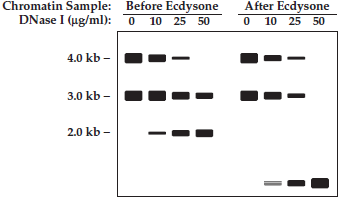
iGenetics 3rd Edition by Peter Russell
Edition 3ISBN: 978-0321569769
iGenetics 3rd Edition by Peter Russell
Edition 3ISBN: 978-0321569769 Exercise 5
In Drosophila, pulses of the steroid hormone, ecdysone, trigger molting between the larval stages and then, at the end of the larval stages, trigger the formation of a pupa, where the larva will metamorphose into an adult fly. Immediately after the ecdysone pulse at the end of the larval stages, transcription of several genes, including Eip93F , is dramatically increased. To investigate how ecdysone regulates Eip93F , chromatin is isolated from staged wild-type animals just before and just after the ecdysone pulse at the end of the larval stages. The chromatin is distributed to separate test tubes, where it is digested for 2 minutes with different concentrations of DNase I. DNA is then purified from each sample and digested with Eco RI. The resulting DNA fragments are then resolved by size using gel electrophoresis, and a Southern blot is made. The Southern blot is probed with two Eco RI fragments from the Eip93F gene: a 4.0-kb fragment from its promoter and a 3.0-kb fragment from its proteincoding region. The following figure shows the results, where the thickness of the band corresponds to the intensity of hybridization signal: 
a. Explain why the 4-kb band, but not the 3-kb band, diminishes in intensity when chromatin that was isolated before the pulse of ecdysone is treated with increasing concentrations of DNase I. How do you explain the increasing amounts of the 2-kb band in these samples?
b. Explain why both the 4-kb and 3-kb bands diminish in intensity when chromatin isolated after the pulse of ecdysone is treated with increasing amounts of DNase I. How do you interpret the increasing amounts of low molecular weight digestion products in these samples?

a. Explain why the 4-kb band, but not the 3-kb band, diminishes in intensity when chromatin that was isolated before the pulse of ecdysone is treated with increasing concentrations of DNase I. How do you explain the increasing amounts of the 2-kb band in these samples?
b. Explain why both the 4-kb and 3-kb bands diminish in intensity when chromatin isolated after the pulse of ecdysone is treated with increasing amounts of DNase I. How do you interpret the increasing amounts of low molecular weight digestion products in these samples?
Explanation
In order to fully respond to this questi...
iGenetics 3rd Edition by Peter Russell
Why don’t you like this exercise?
Other Minimum 8 character and maximum 255 character
Character 255


